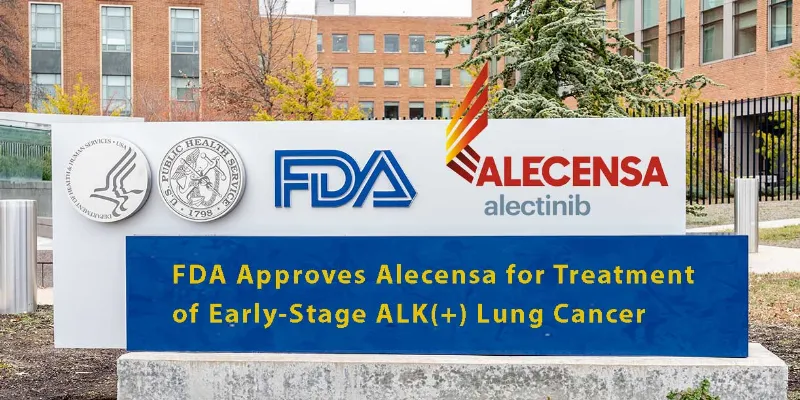FDA Approves Alecensa for ALK+ Lung Cancer Following 76% Drop in Risk of Death

19 April 2024
Genentech announced that the US Food and Drug Administration (FDA) has approved Alecensa (alectinib) as the first and only adjuvant treatment for patients with early-stage, ALK-positive non-small cell lung cancer (NSCLC) who have undergone tumor resection. The approval was followed by the impressive results from the Phase III ALINA study, which showed that Alecensa reduced the risk of disease recurrence or death by a remarkable 76% compared to traditional platinum-based chemotherapy.
This approval marks a significant advancement in targeted cancer therapy, especially for younger patients at high risk of recurrence.
Dr. Levi Garraway, Genentech's chief medical officer, described ALINA’s disease-free survival data as “unprecedented,” stating that “With an unprecedented 76% reduction in the risk of disease recurrence or death versus chemotherapy, Alecensa significantly improves upon the standard of care for people with early-stage ALK-positive lung cancer.”
The Importance of Early-Stage Treatment
Lung cancer remains one of the most common and deadly cancers worldwide and about half of all early-stage lung cancer patients experience disease recurrence after surgery despite receiving adjuvant chemotherapy. Alecensa's approval addresses this critical need by offering a targeted treatment option that significantly improves the chances of preventing disease recurrence. This is particularly vital for ALK-positive NSCLC patients, who are generally younger and at a higher risk of developing complications such as brain metastases.
Study Insights and Global Impact
The ALINA study enrolled 257 patients with stage IB to IIIA tumors. It was a randomized, active-controlled, multicenter, open-label study comparing Alecensa with platinum-based chemotherapy. The dramatic reduction in risk provided by Alecensa was also accompanied by an improvement in central nervous system disease-free survival, further highlighting its efficacy.
In addition to the impressive clinical outcomes, the safety and tolerability of Alecensa were consistent with previous trials, with no unexpected safety findings. These results were so compelling that they were featured at the European Society of Medical Oncology Congress 2023 and published in the New England Journal of Medicine in April 2024.
Routine Testing and Treatment Selection
The National Comprehensive Cancer Network® (NCCN®) guidelines now recommend routine testing for ALK, EGFR, and PD-L1 biomarkers in patients with early-stage NSCLC. This testing is crucial for selecting the most appropriate adjuvant therapy, ensuring that patients receive personalized and effective treatment.
“The approval of Alecensa marks a pivotal moment for people newly diagnosed with early-stage ALK-positive lung cancer, who until now, were not able to receive ALK-specific therapy. These patients, who are typically diagnosed at a younger age, often face recurrence and have a higher risk of developing brain metastases than those with other types of NSCLC. Now, with this significant advance, it is more important than ever that all people diagnosed with early-stage lung cancer undergo testing for ALK and other recommended biomarkers to receive the treatment most appropriate for them,” said Dr. Ken Culver, Director of Research and Clinical Affairs at ALK Positive Inc.
About Alecensa (alectinib)
Alecensa (alectinib) is a prescription medication for treating NSCLC caused by an abnormal anaplastic lymphoma kinase (ALK) gene. It is used as adjuvant therapy post-surgery to prevent recurrence or as a treatment for metastatic cases. Safety and effectiveness in children are unknown, and side effects may lead to dose adjustments or discontinuation. Patients must undergo testing to confirm Alecensa's suitability.











Comments
No Comments Yet!